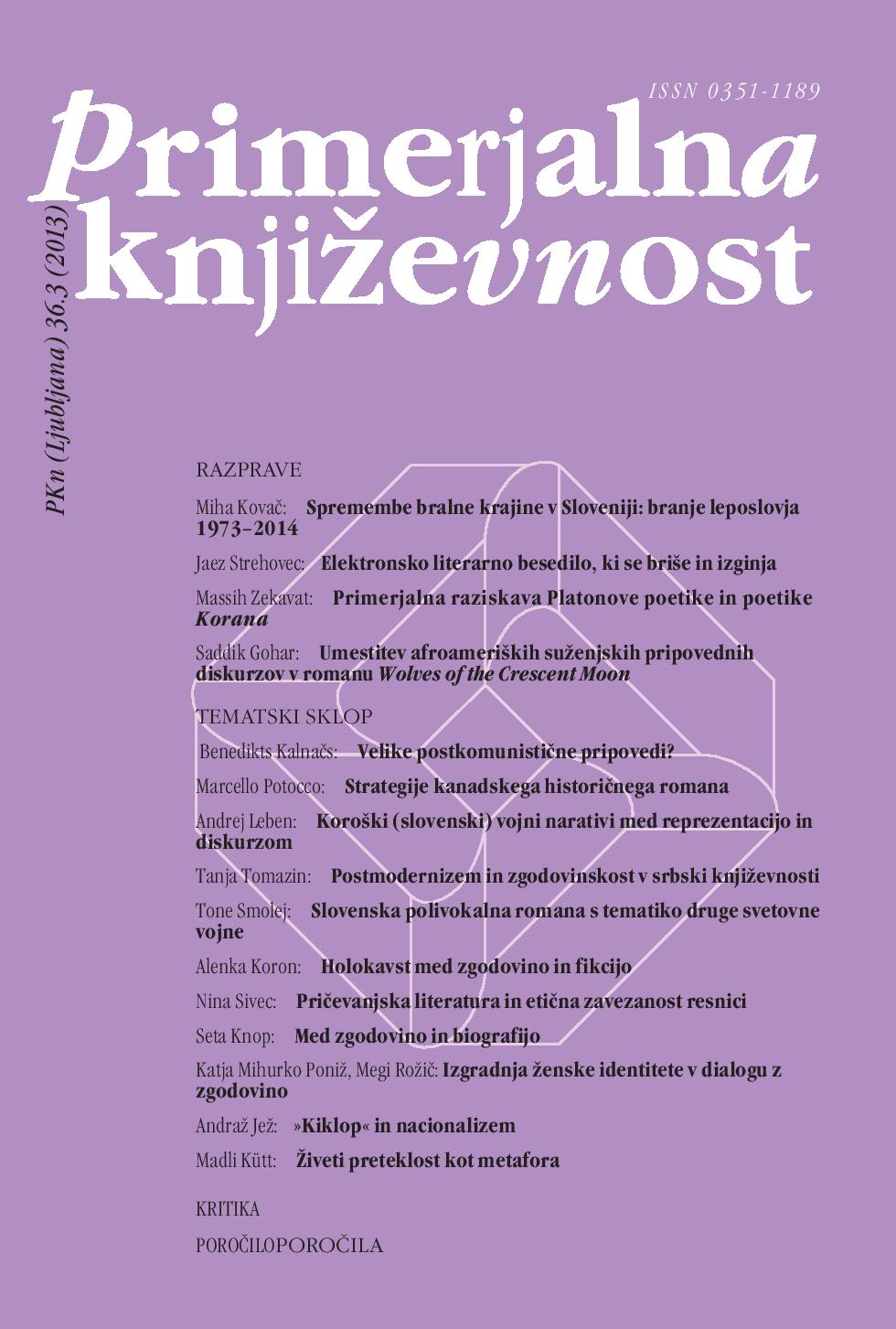A Comparative Study of the Poetics of Plato and Qur’ān
Keywords:
Plato, Qurʾān, comparative poetics, literature, poetry, truth, inspirationAbstract
This article aims to comparatively investigate the poetics of Plato and Qurʾān and explicate the reasons behind their ambivalent denunciations of poets and poetry in an attempt to open a ground for the meeting of their descendent literary traditions, and to suggest that literature and poetry can proffer worldly outlooks to transcend mundane boundaries.References
Arazi, A. “Shiʿr: In Arabic: The Pre-Modern Period.” The Encyclopaedia of Islam. New edition. Vol. 9. Ed. C. E. Bosworth, E. Van Donzel, W. P. Heinrichs, and G. Lecomte. Leiden: Brill, 1997. 448–462.
Bauer, Thomas. “Insanity.” Encyclopaedia of the Qurʾān. Vol. 2. Ed. Jane Dammen McAuliffe. Leiden and Boston: Brill, 2004. 539–541.
Chabbi, Jacqueline. “Jinn.” Encyclopaedia of the Qurʾān. Vol. 3. Ed. Jane Dammen McAuliffe. Leiden and Boston: Brill, 2004. 43–50.
Cohen, Mark R. Under Crescent and Cross: The Jews in the Middle Ages. Princeton: Princeton University Press, 1994.
Dodds, E. R. The Greeks and the Irrational. Berkeley, Los Angeles, and London: University of California Press, 1997.
Dols, Michael W. Majnūn. The Madman in Medieval Islamic Society. Ed. Dianna E. Immisch. Oxford: Clarendon Press, 1992.
Fahd, T. “Divination.” Encyclopaedia of the Qurʾān. Vol. 1. Ed. Jane Dammen McAuliffe. Leiden and Boston: Brill, 2004. 542–545.
– – –. “Shāʿir: In the Arab World: Pre-Islamic and Umayyad Periods.” The Encyclopaedia of Islam. New edition. Vol. 9. Ed. B. Lewis, V. L. Menage, Ch. Pellat, and J. Schacht. Leiden: Brill, London: Luzac & Co., 1986. 225–228.
Ferrari, G. R. F. “Plato and Poetry.” The Cambridge History of Literary Criticism: Classical Criticism, Vol. 1. Ed. George A. Kennedy. Cambridge: Cambridge University Press, 1993. 92–148.
Habib, M. A. R. A History of Literary Criticism: From Plato to the Present. Malden: Blackwell, 2005.
Halman, Talat Sait. “Shāʿir: In Turkey.” The Encyclopaedia of Islam. New edition. Vol. 9. Ed. C. E. Bosworth, E. Van Donzel, W. P. Heinrichs, and G. Lecomte. Leiden: Brill, 1997. 239–240.
Heinrichs, Wolfhart. “The Meaning of Mutanabbī.” Kugel 120–139.
Janaway, Christopher. “ Plato and the Arts.” A Companion to Plato. Ed. Hugh H. Benson. Malden: Blackwell, 2006. 388–400.
Jones, Alan. “Orality and Writing.” Encyclopaedia of the Qurʾān. Vol. 3. Ed. Jane Dammen McAuliffe. Leiden and Boston: Brill, 2004. 587–593.
– – –. “Poetry and Poets.” Encyclopaedia of the Qurʾān. Vol. 4. Ed. Jane Dammen McAuliffe. Leiden and Boston: Brill, 2004. 110–114.
Keane, Catherine. “Defining the Art of Blame: Classical Satire.” A Companion to Satire. Ed. Ruben Quintero. Malden: Blackwell, 2007. 31–51.
Kugel, James L., ed. Poetry and Prophecy: The Beginnings of a Literary Tradition. Ithaca and London: Cornell University Press, 1990.
Kugel, James L. “Poets and Prophets: An Overview.” Kugel 1–25.
Meisami, J. S. “Truth and Poetry.” Encyclopedia of Arabic Literature. Vol. 2. Ed. Julie Scott Meisami and Paul Starkey. London and New York: Routledge, 1998. 781–782.
Miner, Earl. Comparative Poetics: An International Essay on Theories of Literature. Princeton: Princeton University Press, 1990.
Moreh, S. “Shiʿr: In Arabic: The Modern Period.” The Encyclopaedia of Islam. New edition. Vol. 9. Ed. C. E. Bosworth, E. Van Donzel, W. P. Heinrichs, and G. Lecomte. Leiden: Brill, 1997. 462–465.
Moretti, Franco. “Conjectures on World Literature.” New Left Review 1 (2000): 54–68.
Moss, Jessica. “What Is Imitative Poetry and Why Is It Bad?” The Cambridge Companion to Plato’s Republic. Ed. G. R. F. Ferrari. New York: Cambridge University Press, 2007. 415–444.
Murray, Penelope, ed. Plato on Poetry. Cambridge: Cambridge University Press, 1996.
Murrin, Michael. “Poetry and Prophecy: The Beginnings of a Literary Tradition by James L. Kugel.” Modern Philology 91 (1993): 202–206.
Neuwirth, Angelika. “Rhetoric and the Qurʾān.” Encyclopaedia of the Qurʾān. Vol. 4. Ed. Jane Dammen McAuliffe. Leiden and Boston: Brill, 2004. 461–476.
Nöldeke, Theodor, Friedrich Schwally, Gotthelf Bergsträßer, and Otto Pretzl. The History of the Qurʾān. Ed. and trans. Wolfgang H. Behn. Leiden and Boston: Brill, 2013.
Plato. The Collected Dialogues of Plato. Eds. Edith Hamilton and Huntington Cairns. New York: Pantheon Books, 1961.
Shahīd, Irfan. “Another Contribution to Koranic Exegesis. The Sūra of the Poets (XXVI).” Journal of Arabic Literature 14 (1983): 1–21.
– – –. “The Sūra of the Poets, Qurʾān XXVI: Final Conclusions.” Journal of Arabic Literature 35 (2004): 175–220.
– – –. “The Sūra of the Poets Revisited.” Journal of Arabic Literature 39 (2008): 398–423.
Stepein, Rafa. “A Study of Sūfī Poetics: The Case of ʿAt. t. ār Nayshābūrī.” Oriens 41 (2013): 77–120.
Swift, Jonathan. “Thoughts of Various Subjects.” A Tale of a Tub with Other Early Works 1696–1707. Ed. Herbert Davis. Oxford: Basil Blackwell, 1965. 241–245.
The Koran. Trans. N. J. Dawood. Middlesex: Penguin Books, 1976.
Wehr, Hans. A Dictionary of Modern Written Arabic. Ithaca: Spoken Language Services, 1976.
Welch, A. T. “Madjnūn.” The Encyclopaedia of Islam. New edition. Vol. 5. Ed. C. E. Bosworth, E. Van Donzel, B. Lewis, and Ch. Pellat. Leiden: Brill, 1986. 1101–1102.
Zwettler, Michael. “A Mantic Manifesto: The Sūra of the Poets and the Qurʾānic Foundations of Prophetic Authority.” Kugel 75–119.
– – –. “The Sura of the Poets: ‘Final Conclusions’?” Journal of Arabic Literature 38 (2007): 111–166.


